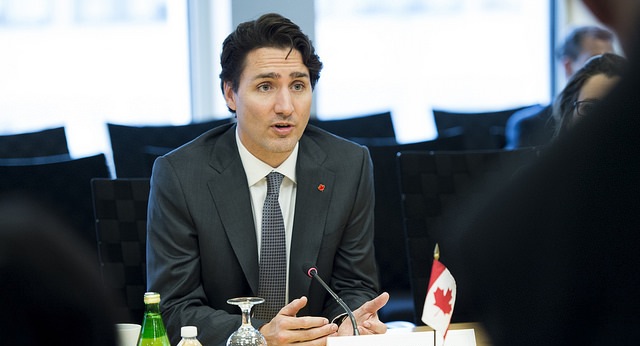Like this article? rabble is reader-supported journalism. Chip in to keep stories like these coming.
The Trudeau government has tabled its first budget and it is radically different from what we got from the Harper government for nearly a decade.
The Trudeau government obviously believes that if a government wants to achieve an important goal it should invest — not, as Harper did, create a complex series of boutique tax measures.
There are no new boutique tax credits for individuals in this budget, and no special tax measures for businesses.
The budget announces a number of major spending measures: for First Nations education and infrastructure, for green energy projects, for public transit, for poor and single seniors.
But when it comes to tax credits, it not only does not create any new ones, it cancels the Conservatives’ credits for kids’ sports and arts activities.
Instead of what it calls the Harper government’s complicated child benefit system, this budget creates the promised Child Tax Benefit, which is largely tax-free and targeted to lower income families.
More money for families; no universal child care (yet)
In his budget speech, Finance Minister Bill Morneau touts this new initiative as a major breakthrough, on par with such landmark programs as universal health care and the Canada Pension Plan.
There may be a touch of exaggeration there.
Harper’s Universal Child Care Benefit, which this new measure supplants, was a Conservative response to an earlier Liberal government’s national child-care plan. The Conservatives said they did not believe in big government programs and did not favour government-provided child care. Give families money and they will decide how to spend it on child care, the Harper people proclaimed.
Now the Trudeau team seems to have bought into that free market approach.
The budget speech tells us the new Canada Child Benefit will give a single mother with one young child, who earns $30,000 per year, a tax-free annual benefit of $6,400. That will certainly be very welcome. But per-child daycare costs in some Canadian cities can run to upward of $60 per day, or about $15,000 per year.
The Liberals have not entirely forgotten their engagement, more than a decade ago, to make accessible and affordable child care universally available. On that, the budget says: “For Canadian families, high quality, affordable child care is more than a convenience; it’s a necessity.”
What the budget actually does, concretely, is announce that the government will, a year from now, set up a National Framework on Early Learning and Childcare. The Framework will cost $500 million, of which $100 million will be for on-reserve, Indigenous child care and early learning.
More generous EI; big funding increase for First Nations; help for poor seniors
On other fronts, the budget significantly loosens Harper government restrictions on employment insurance (EI), especially for the 12 economic regions that have experienced the sharpest and most severe increases in unemployment. In those regions, the budget increases the duration of benefits by five weeks, to a maximum of 50 weeks.
Morneau announced $2.6 billion over five years for First Nations education, more than double the $241 million per year the Harper government pledged in its last budget. Harper had earlier committed to a bigger sum, $1.25 billion over three years, but backtracked when First Nations balked at his proposed reforms to the system for managing their schools. There are no strings attached to the Trudeau government’s funding pledge. The budget even commits extra funds to “support the transformation of the current reserve education system through a respectful process of consultation and partnership with First Nations.”
The budget will increase the Guaranteed Income Supplement (GIS) for poor, single seniors by 10 per cent. This will make a big difference to 900,000 Canadians living on the edge of poverty. It is an example of the current Liberals’ penchant for targeted social spending.
There is one smallish item that is notable because it is the first time we have seen a federal budget favourably use the word “union” in a very long time.
Under the heading “Strengthening Union-Based Apprenticeship Training” the budget pledges $85.4 million over five years to “develop a new framework” to foster “greater union involvement in apprenticeship training” and to “support innovative approaches and partnerships with employers and other stakeholders.”
Elsewhere the budget touches on many of the Trudeau government’s political priorities. It even commits $10.7 million over four years for an electoral reform consultation process.
And if there are unanticipated economic headwinds?
We all now know that the budget does not come near the Liberals’ one-time projected deficit target of $10 billion. The actual figure is nearly triple the earlier forecast. And, in the budget, the finance minister even backs away from the election campaign pledge to achieve fiscal balance within the Liberals’ current mandate.
There are, however, credible numbers in the budget that demonstrate how its significant stimulative spending initiatives should result in increases to the gross domestic product (GDP). If the GDP does indeed grow as forecast, we will see no significant increase in the key debt-to-GDP ratio, even if we run modest annual deficits for a while.
That ratio is a more important measure of a country’s fiscal health than the simple deficit figure.
Right now, Canada has a far lower debt-to-GDP ratio than most other developed economies. Based on this budget’s figures, we do not stand to lose our comparative advantage any time soon.
Of course, there is always the possibility, to which the budget makes brief allusion, of some sort of global economic shock wave, such as an economic meltdown in China.
In that case, all bets will be off.



